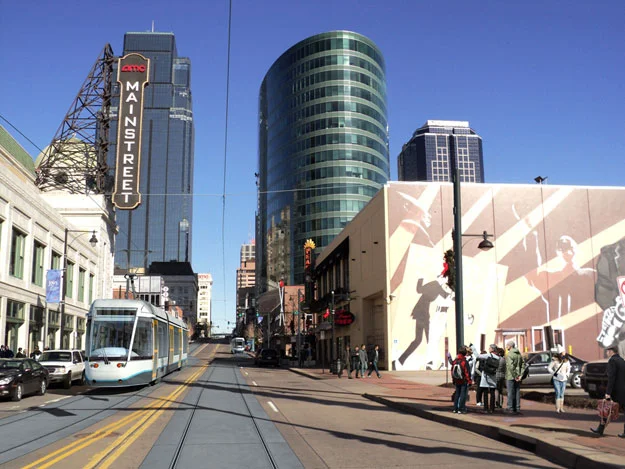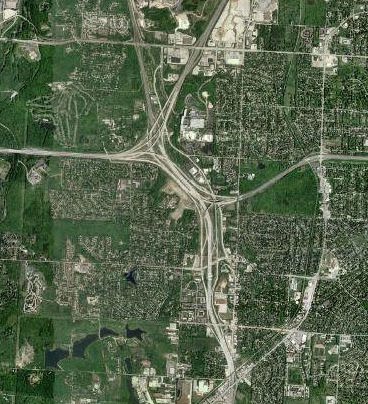Cognitive Dissonance in Transportation Funding
The world of transportation may be changing rapidly, but the world of transportation funding certainly is not. Like a giant ship turning around very slowly, we still are loaded down with the baggage of thinking from 70 years ago. Sometimes it’s just too easy to point out the hypocrisy, but it still needs to be done. Today’s example comes from the Kansas City metro area.
Last fall, a small group of residents in downtown Kansas City voted to fund a Transportation Development District (TDD) with the purpose of funding the construction and operations of a two-mile long streetcar line downtown.
A TDD is essentially one of a series of self-taxing districts, where people agree to raise sales and/or property taxes for a specific purpose. In this case, it will fund a $100 million line, which will be the first new rail transit in Kansas City since the streetcars were torn out in the 1950’s.
The vote comes after decades of heart-wrenching debates and votes regarding rail transit in the city. After multiple citywide votes were shot down by voters for a much more expansive system, rail promoters chose to focus instead on a small, starter line, funded directly by the people it serves and most benefits.
I’m glad for KC, and ecstatic to see this move forward and be operational by 2015. And in an even smarter move, the streetcar line will be free. That decision should have a great impact on its use, and help begin to wean people off the notion of easy motoring and free parking in the heart of the city.
I’d also be remiss if I didn’t mention that the voter-approved plan is essentially what the Urban Society suggested as an approach back in 2007. At the time, city leaders chose to put yet another expansive and expensive plan before the voters. It was predictably shot down.
As one of the former Board Members of the Urban Society, it’s nice to occasionally say, we told you so.
When considering plans for the core of the city, City leaders would do well to listen to those most passionate about it, instead of suburban voices with competing interests. Understand your market and your customers, like any savvy business does. But that’s a story for another day.
The interesting thing to ponder is what this effort tells us about the future of transportation funding, versus the current state.
To contrast the streetcar funding, about ten years ago, the Missouri Department of Transportation started a project to rebuild the infamous Grandview Triangle intersection, which is the intersection of Interstates 435, 470 and US 71. The stated purpose of the project was to reduce congestion for suburban commuters. In essence it would reduce travel times by about a minute at rush hour, for a cost of $200 million in 2001 dollars.
Like all highway projects, it was chosen, funded and built with no public vote. The voters of the entire state of Missouri, and in fact the entire United States were the primary funders of the project. Again, the project was entirely for the benefit of suburban commuters, since the intersection had no congestion outside of at most 10 hours per week.
This is the cognitive dissonance that says one group of people must vote for and fund their own lifestyle choices (urbanites who use transit); while another group gets their lifestyle choices funded by everyone.
I’m actually not at all opposed to the approach used for the streetcar line. In fact, I think that it’s a much fairer way to go about funding major transportation projects that require public dollars.
I simply wonder: why don’t we do this for every major project? The primary recipients of our largesse for the Grandview Triangle are people who live within about a ten-mile radius of it. What if they had to fund its rebuilding? Would those voters have chosen to raise their own taxes for this one intersection?
The KC streetcar plan is a great start for the city, and I predict in no time it will lead to further expansions. The simple, logical approach is what promoters of the core have wanted for many years.
My hope is that the project is inspiration to take a new look at the entire model for transportation funding. I’m not opposed to someone’s choice to live in the suburbs and drive everywhere. But I don’t want to pay for their choice, any more than they want to pay for the construction of the transit system I want to use. Until we devise a fairer method for funding infrastructure, that puts the costs squarely with the users, we’ll continue to fight the same battles over and over. And the cognitive dissonance will only get louder.
If you got value from this post, please consider the following:
- Sign up for my email list
- Like The Messy City Facebook Page
- Follow me on Twitter
- Invite or refer me to come speak
- Check out my urban design services page
- Tell a friend or colleague about this site





